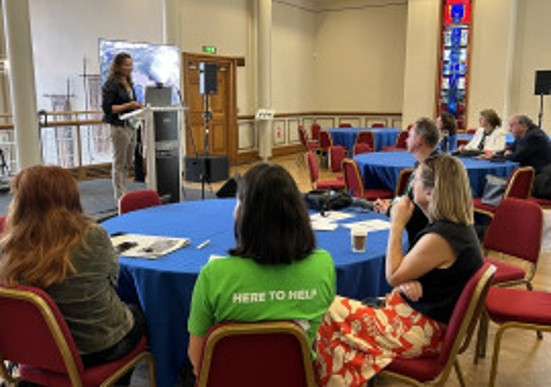The ECCA2023 Closing Session started with a dialogue ‘What we see from space - observing the Earth/adaptation on the ground’, between Susanne Mecklenburg (European Space Agency, one of the sponsors of ECCA2023) and Frank McGovern (the Environmental Protection Agency of Ireland and chair of JPI Climate).
During the ECCA2023 closing ceremony, Frank noted that Europe has been a leader in investing in space-based observations of Earth and he invited Susanne to outline the scale of investment. The European Space Agency (ESA) has a vibrant programme and about 99% of their operations is climate related, providing climate-relevant observations, for example requirements needed for the design and development of space missions that make climate applications of the data possible. The ESA works closely with the European Commission (EC) on the multibillion investment to run the Climate Change Initiative (CCI), which measures and monitors climate change indicators. ESA’s approach is more from the physical observations and evidence side than adaptation. That is why ESA decided to support ECCA2023 and to promote uptake of this huge European asset of satellite data by the adaptation community and to enhance the uptake of space data even further, especially given the multitude of valuable measurements.
Susanne highlighted a message to take home: “We need to think about the right scale of the space data that we are supplying, and I think this has already been taken on board in many ways in the new missions that are coming. We are looking at a mission called Land Surface Temperature Monitoring (LSTM) that is going to be launched towards the second-half of this decade and for many of the applications that I've seen here for agriculture, water resource management, management of urban heat hotspots, we're going in the right direction.”
Sea level rise (SLR) was one of the topics explored at ECCA2023 and important for island nations such as Ireland. It is one of the foremost known impacts of global warming on people’s lives and it can be studied using Earth Observation. Combining observations and climate modelling is key to the prediction and projection of what is likely to happen over the next couple of decades for the adaptation community.
ESA is assessing more than 25 climate indicators through its CCI programme providing data on the state of the planet and the trend of climate change parameters. As these data sets are focused more on research and development and on preoperational development, ESA works very closely with its operational counterparts, for example the Copernicus Climate Change Service.
Frank asked Susanne about global warming, the impacts it might have and how Earth Observation from space can support decisions on mitigating those in the short term. There's great potential for Ireland to work more closely with ESA as part of the CCI and Susanne added: “We're looking forward to the expertise from Ireland and to data being taken up to put out in the community.” She added that adaptation is becoming more crucial, as irreversible developments caused by climate change become more likely.
Susanne emphasised that ESA’s missions provide a global snapshot of where we stand with CO2 emissions and that ESA is working with national entities to understand the differences in method and result between the bottom-up approach that most countries use for the global stocktake. Knowing what industries they have; they can apply a particular statistical model and then arrive at a particular estimation of CO2 emissions. She said: “We want to use space data and inverse modelling to have a more global view and make that accessible, in the same way that people can use the CCI open data portal.”
The final question was on how to interpret this data for non-specialist users and if ESA sees opportunities for the private sector to work with these data and if it could offer help?
With ESA’s new extension of the CCI it wants to move further into the policy area. One of the major focuses of the extension is the Paris Agreement, including adaptation, to focus more on preoperational development efforts and to support adaptation projects. Potential areas to focus on are health, fire and ecosystems issues. Later this year, a meeting of ESA with EC experts will aim to find ways on how to be complementary and synergistic, to support a number of pilot projects and to define what the value of space data could be for adaptation. The European Space Agency wants to work more closely with policymakers and with practitioners.
Author: Maija Malnaca

Explore the photo galleries from:
-ECCA2023 Monday 19 June, 2023 here.
-ECCA2023 Tuesday 20 June, 2023 here.
-ECCA2023 Wednesday 21 June, 2023 here.
-ECCA2023 Extra photos (side events, creative arts, presentations, workshops, etc.) here.
